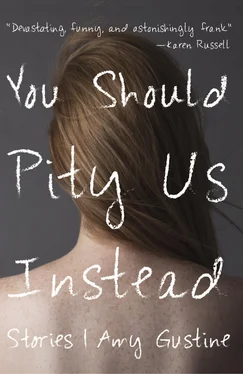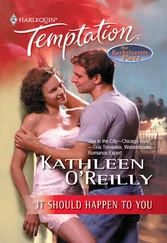Obi turned toward the patio door.
“Sir?” Brian asked. “Sir? Do you believe me?”
Obi was sixteen, barely three months into his license, when he ran a red light, T-boning Gerald Sorens, a paunchy father of four with a bumper sticker across his rear window. Everything we see is a shadow cast by what we don’t see. Forty years later he still couldn’t account for it. He hadn’t been speeding or drunk or fiddling with the radio or talking on a cell phone. There were no cell phones back then. It was broad daylight, but the sun was at his back. Despite all this, Gerald Sorens died on a gurney in the middle of the intersection, five police cars directing traffic around him while Obi knelt in the plastic shards of shattered headlights, praying.
“Sir?” Brian asked again. “Did you hear me?”
Obi looked down at the note. “It’s when we’re innocent that we’re confused.” Then he smoothed the rough draft and the edited version he’d pulled off Jolly’s door over his knee, one on top of the other, folded them together into a perfect square and put them in his pocket. He and Brian sat in silence, staring at the sand-colored carpet. Neither man wore a watch and there were no visible clocks, no audible ticking, nothing at all to mark time, not even the sun, which shone fixedly on the opposite wall like a bare bulb. Time made no difference now. If you cannot understand or be understood, if you cannot make amends, what good are the hours and the days and the weeks?
But Karen was waiting. Obi made himself speak up. “I think they missed something. Jolly must have left a note. She had to have left something.”
“Did they look at her computer? Emails and stuff?”
Obi brightened. “They said they did, but maybe not. Or they didn’t understand.”
Brian went next door and brought back Jolly’s laptop. In a few seconds he had it booted up and he’d opened her emails. Sitting at the table, they analyzed each message, memo, and PowerPoint presentation for hidden meaning. Finding nothing by way of explanation, Obi slumped in his chair. “I thought for sure there’d be something.”
“I’m sorry,” Brian said.
“If not a note, then a clue. Something.”
“Maybe it’s in code. Something the police wouldn’t notice.”
Obi looked at him strangely.
“That’s dumb. Sorry. I watch too much TV.”
“No, that’s what I thought. That she might have left a code.”
They sat for several more seconds considering this until Brian said, “What if I taped her place? You know, before you touch anything, I’ll video it exactly as she left it. Then you can study it all you want.”
“You have a camera?”
Karen kept saying she wished they’d bought a camera so they would have video of Jolly, but Obi was secretly glad they didn’t. He felt pretty sure he wouldn’t make it if he had to watch her or hear her voice.
Brian retrieved the camera from a black bag under the TV.
“Don’t touch anything,” Obi said. “Just tape.”
“Yes, sir. I got it.”
Brian unlocked Jolly’s door and went in, leaving it wide open. From where Obi stood, in the doorway of Brian’s apartment, he could see a trapezoid of beige wall that could have belonged to anybody.
Brian was gone several minutes. Occasionally he would call out what he was doing. “I’m in the kitchen, looking in the dishwasher.” When he was done, he and Obi sat side by side on the edge of the coffee table and watched the playback over the TV. Repeatedly, they freeze-framed the video to discuss the arrangement of objects — how book titles might be combined to spell out a message, if seemingly innocuous bills and shopping lists could have hidden meaning. They discussed what significance there could be to Jolly having no medicine of any sort in the house except the Percocet she’d overdosed on. No Tylenol or Advil, no NyQuil or Sudafed or Pepto-Bismol. While they dissected and discussed, writing notes and rewinding the tape a hundred times, the sun finally gave up for the day. At some point one of them turned on a light.
“Sir, I don’t think there’s anything here,” Brian said. They were seated across from each other on the floor, the notepad from the airline disassembled, its pages scattered on the coffee table and covered with anagrams of the words Jolly left behind via cereal boxes and shopping lists.
The feeling made its way from Obi’s knees to his chest again and he began to sob. “What am I going to tell her mother?” he bleated, bowing his head and pinching the bridge of his nose until his knuckles went white. “She had to have a reason.”
“Tell her it was my fault,” Brian said. “Tell her Jolly lived next door to a depraved soul unworthy of her, and if he’d only been a better man, Jolly would still be here.”
Obi looked up, sobs still shaking his shoulders.
“Tell her it was me, that I’m the one to blame,” Brian repeated.
Obi sucked in his breath several times. When his shoulders finally went still, he whispered, “Can you do me one more favor?”
“Of course.”
“Can you bring me Jolly’s things?”
Brian nodded. Obi gave him the list and one by one he carried Jolly’s things to her father. Her hairbrush. The tarnished silver spoon ring Karen’s brother had made. Her college diploma. Her key ring with the Siamese cat that looked like the cat she had in grade school. A box of warranty cards, receipts, and instructions he’d already videotaped and dissected for secret meaning. Perfume bottles and a tray filled with lipsticks and blushes. Old yearbooks and greeting cards. A swimming trophy from high school. A camera, a boom box, and an iPod. A stuffed frog she’d carried everywhere until she was seven.
When Obi satisfied himself that everything on Karen’s bring-home list had been collected, he sent Brian back to pack the remaining things for charity. At three a.m. Brian touched his shoulder. Obi had fallen asleep on the floor in front of the balcony door, which looked like the black mouth of a deep cave.
“Sir? Sir? You want to lie on the couch?”
“Is it all done?”
“Yes, sir, it’s done.”
Obi struggled to a stand, stiff from lying on the thin carpet. Outside the heat sat waiting, even without its sun. Brian stayed in his own place while Obi went over to Jolly’s.
A neat line of boxes along one wall. Across the room a purple couch and yellow chair, a silver coffee table, sheer drapes layered below velvet side panels, an enormous mirror framed with black glass. Somehow, in his zeal to find the smallest clue, Obi had not noticed the furniture itself on the videotape. It wasn’t what Jolly had brought from Columbus. That had been a profusion of flowered slipcovers and tables in need of a fresh coat of paint, a rickety coatrack made of old canes lashed together with twine and picture frames whose original life had been as racket presses. Obi opened the empty cupboards one by one, then the medicine cabinet and the closets. He made himself glance at the bed, but it was stripped bare, a mattress on a metal frame that could have belonged to anyone, to a complete stranger.
Movement on the balcony caught his eye and Obi rushed over to the dark glass, flipped the lock and pushed open the door, for a crazy moment thinking Jolly had been out there all along. Brian was leaning over the railing of his balcony, the hook of an old-fashioned umbrella employed midair to snatch a red bikini from the spines of a potted cactus. Looking up at Obi, Brian lost his balance and for a moment dipped forward like a gymnast on the uneven bars. Obi lunged to catch him as the umbrella dropped three floors, its metal a sharp crack on the stone garden below. Brian righted himself. He and Obi looked at the suit, still snagged on the cactus.
Читать дальше












